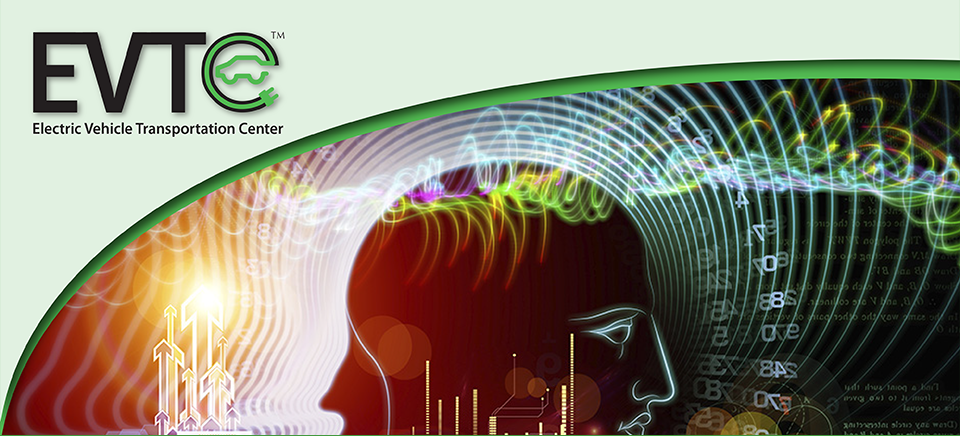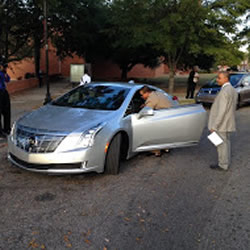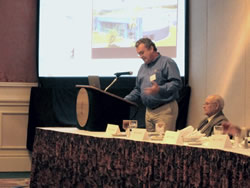EDUCATION
University Education
University of Central Florida
There are two transportation related academic programs within the UCF College of Engineering and Computer Sciences – one in the Department of Electrical Engineering and Computer Sciences (407-823-2786) and one in the Department of Civil, Environmental, and Construction Engineering (407-823-3315).
The Department of Civil, Environmental, and Construction Engineering is offering the following course in the Spring 2015 semester. This course impacts sustainability and electric vehicles:
CCE 5220
Green Design and Construction
Introduction of sustainability concepts as they relate to
construction design and delivery. Topics include Leadership
in Energy and Environmental Design (LEED) categories,
economic analysis, and integrated project management.
The following course was offered in the Fall 2014 semester:
CCE 6938
Dynamics of Sustainable Systems
This course uses dynamic modeling as an experimental
platform to study and analyze the dynamics of socio-technical problems in
the engineering and construction industry. The course has two broad
objectives: The first one is to learn dynamic systems approach and systems
simulation as a methodology to study and understand complex, dynamic
problems as they relate to sustainability. The second objective of the
course is to expose the students to a variety of real dynamic problems
related to civil infrastructure systems and the built environment, and how
to analyze the social, economic, and environmental issues as they relate
to sustainability.
Within the Civil Engineering Department, graduate students have completed specific carbon and energy footprint calculations of alternative passenger vehicles including hybrid, plug-in hybrid, and battery electric vehicles. The calculation results have been submitted to the Journal of Energy. In addition to environmental impacts, the social and economic impacts associated with alternative passenger vehicles have also been quantified. Optimum vehicle mix in the United States is estimated based on their socio-economic benefits versus environmental impacts. The trade-off among these bottom lines (macro-level economic, social, and environmental aspects) was analyzed. These results were submitted to the Journal of Transportation Research Part A: Policy and Practice, and the International Journal of Cleaner production. In addition, other segments of alternative vehicle technologies such as commercial medium duty trucks and public buses are being analyzed. These studies aim to quantify the environmental impact reduction potentials of alternative vehicle options in these segments.
Within the Electrical Engineering Department, a new course on distributed optimization and control for smart grid is being developed and will be offered in spring 2015 as an undergraduate elective and an entry-level graduate course in electrical engineering. The course will specifically address grid-to-vehicle (G2V) and vehicle-to-grid (V2G) operations and will be broadcast to eight other universities. This course is also part of a U.S. Department of Energy project at UCF.
EEL 5593 ECS-ECE
Distributed Control and Optimization for Smart Grid
Electric power systems, transmission and distribution networks, voltage stability and VAR control, dispatch of distributed generation, optimization, frequency control, electricity markets and incentive controls.
In addition, the following related course is also being taught during the Spring 2015 semester:
EEL 4216 ECS-ECE
Fundamentals of Electric Power Systems
Three-phase power representation and analysis, transformers, per unit system, symmetrical components, faults and transmission lines.
The following classes will be taught during the Fall 2015 Semester:
EEL 4205 Electric Machinery: Fundamentals of DC and AC electric machines
EEL 4216 Fundamentals of Electric Power Systems: Three-phase power representation and analysis, transformers, per unit system, symmetrical components, faults, and transmission lines.
EEL 4932 Global Energy Issues: The course critically examines issues associated with the technical, economic, societal, environmental, and geopolitical aspects of energy.
EEL 5937 Communication and Networking for Smart Grid: Communication solutions to increase grid efficiency, reliability, and safety.
EEL 6255 Advanced Power Systems Analysis: Topics to include symmetrical and unsymmetrical fault analysis, power system estimation and control and power system stability.
University of Hawaii
In September 2014, University of Hawaii at Manoa faculty delivered a technical lecture on battery modeling for academic and industrial applications at the Battery Modeling for Industrial Applications Symposium, held at the University of Warwick (UK). The symposium was designed to engage industry and academia, and to facilitate discussion, interaction, and sharing of work between the two groups. The discussion centered around models to understand behavior in applications including "electric people movers", electric power grid support, renewable energy integration, micro grid, and local building support. (PDF of the presentation)
The University of Hawaii at Manoa, College of Engineering’s Department of Mechanical Engineering offers ME 492, "Special Topics in ME Electrochemical Power Sources Principles, Applications and Issues" for the spring 2015 semester. This course will familiarize students with issues associated with the usage of electrochemical power sources such as EV applications, and covers fundamental knowledge on batteries, supercapacitors and fuel cells, including principles, characterization, use and modeling.
Additionally in ME 482 “Design Project II”, a group of students are designing and building a retrofit kit to convert an internal combustion engine (ICE) vehicle to an EV, with Boeing as one of the sponsors. ME 482 covers the extension of a conceptual design to final design and a prototype. Analysis, materials and part selection, synthesis of working systems is included, along with computer-aided design and finite element modeling, manufacturing specifications, and shop drawings.
For the Spring 2016 semester EE635 "Smart Grids and Renewable Energy Integration" will be offered. This class focuses on the challenges of integrating intermittent renewable energy sources into the power system. The focus is on “smart grid” solutions and potential solutions offered by EV “smart charging.”
The University of Hawaii System’s Honolulu Community College offers an automotive technology curriculum, with hybrid and EV courses that cover basic electrical theory, wiring diagram and schematic use, and electrical system diagnosis.
See http://www.honolulu.hawaii.edu/amt
Tuskegee University
The major event of the year at Tuskegee University featured a daylong Tuskegee University Electric Vehicle Transportation Center day on November 6, 2014. This event was hosted by the Tuskegee EVTC PI, Dr. Prakash Sharma and centered on over 150 students (from 3rd through 12th grade), and their teachers and parents who were invited to view and participate in a daylong electric vehicle activities.
The day started with lectures about the electric vehicle by Mr. Keenan Kenny of Alabama Power and Mr. Thron Crowe of the University of Central Florida/Florida Solar Energy Center. Students were informed about the history of electric vehicles, current and future technologies, charging capabilities and types of electric vehicles, both on the highways and raceways. They were also introduced to a variety of web sites that can be used to further educate themselves about electric vehicle technologies. They explored venues to participate in building and racing electric model cars.
The day continued with classroom demonstrations conducted by Tuskegee University students on renewable energy and electric toy vehicles. These students, teachers and parents learned through first-hand demonstrations on how renewable energy technologies can save energy and resources, as well as provide opportunities for their future in research development and jobs.
From the classroom, the students were then given a hands-on demonstration of the capabilities of different electric vehicles from the Alabama Power fleet. Vehicles included a BMW i3, a Tesla Model S and a Cadillac ELR; all state of the art electric vehicles. Students’ enthusiasm showed in reaction to both the detailed explanation provided by the Alabama Power drivers as well as the driving tour each participant was given around the campus. This was definitely one of the many highlights of the day!
The event concluded with a dinner hosted by Tuskegee at their Kellogg Hotel and Conference Center. Dignitary guests include the Tuskegee Provost, Dr. Cesar Fermin, the Tuskegee Dean of College and Arts, Dr. Lisa Hill, and the Superintendent of Public Schools for Macon County, Dr. Jacqueline Brooks. Also included were two keynote addresses by Mr. Cedric Daniels of Alabama Power and Mr. Kevin Schleith of the University of Central Florida. These addresses included both the history and future outlook for the electric car, as well as a rundown of the Electric Vehicle Transportation Center program and how the audience could both benefit from and be a part of the electric vehicle programs. Finally, WTVM, a local TV station aired a report of the event.
|
|
Other Tuskegee University activities include the seamless integration of EVTC projects in the senior level Physics course curriculum in both fall 2013 and spring 2014 semesters. In spring 2014, based on the EVTC projects, Tuskegee students have successfully won a Sigma Pi Sigma Undergraduate Research Award and Marsh M. White Outreach Award from Society of Physics Students National Office in Washington DC. In spring 2014, Tuskegee students presented posters at the Joint Annual Research Symposium, Tuskegee University (February 2014) and Alabama Academy of Science 91st Annual Meeting, Auburn University, AL (March 2014).
In the Spring 2015 semester Tuskegee University offered the course Physics 499-02 Renewable Energy and Electric Vehicles. The course covers both energy sources and the interactions with electric vehicles. The course is for physics and engineering majors at senior level and first year graduate students and is conducted in collaboration with Alabama Power Company EV experts.





